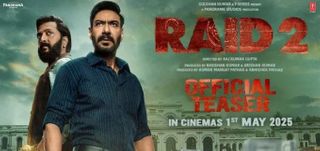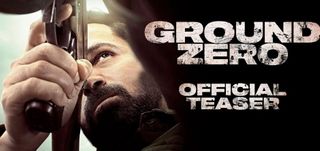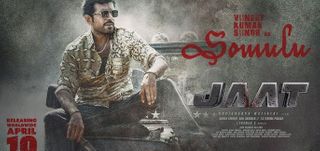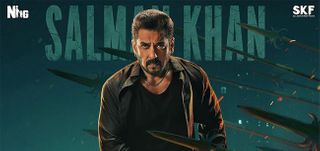Ab Tumhare Hawale Watan Sathiyo Movie Review
Thirty-six years ago when Manoj Kumar made one of India's best-known patriotic potboilers "Upkar", he described it as a "16,000-feet long flag of India".
How do we describe Anil Sharma's 18,000-feet long film? Manoj Kumar would be nonplussed by its variously frantic and fitful thrusts and grunts of across-the-border games that constitute a sprawling marathon in the troubled ties between India and Pakistan.
To telescope war-ridden, politically stressed and historically turbulent history into three hours and more of rabblerousing rhetoric, voluminous songs and high-octane emotions isn't an easy task.
Director Anil Sharma isn't really up to it. At the end of the exhausting film, his political ideology isn't quite intelligible to the audience.
Sharma appears to be an awfully confused fence sitter. While a large chunk of the footage is devoted to showing our neighbours as bushy eye-browed sneaky schemers and manipulators, suddenly the unwieldy script undergoes a dramatic change of heart. At the end we see the flags from the two countries undulating together in a symbolic solidarity.
So which one does "Ab Tumhare..." want to be? "Gadar" or "Veer-Zara"? Confounding, to say the least!
But, sorry, we're jumping the gun. There's plenty of noisy ammunition and riotous rhetoric to be gone through before we reach the flag-friendly finale.
While the guns roar and the soldiers roar even harder, a love triangle unfolds as two soldiers, Kunal (Bobby Deol) and Rajiv (Akshay Kumar), court and win over the demure Shweta (newcomer Divya Khosla).
The re-entry of Rajiv signals the exit of Kunal, making one wonder if director Sharma is impressed by the Ben Affleck-Kate Beckinsale-Josh Hartnett triangle in "Pearl Harbour" or its proud predecessor "Sangam" where soldier Raj Kapoor fought for Vyjayanthimala's hand along with Rajendra Kumar.
"Sangam" or "Pearl Harbour"... "Ab Tumhare Hawale"... seems to believe that matters of the heart are more critical than matters of the state.
On the night before soldier Kunal is summoned to the war front he rushes through a sandstorm to tell Shweta about his love. She has her own story - she tells him about her marriage to Rajiv who has gone missing in action.
Apart from the sheer staleness of the product, the film also suffers from inept editing by Ballu Saluja whereby unnecessary suspense is created over the love triangle. It's actually a love quadrangle since there's Sandali Sinha waiting in the wings for Deol to look her way.
The songs choreographed by Ganesh Acharya portray ethnic chic and trendy patriotism. Unfortunately the music and the heroine's dancing abilities leave much to be desired.
The plot crams in a lot, and yet leaves us with a feeling of being short-changed. The dramatic conflict that holds you marginally has nothing to do with the romantic love or war.
Amitabh Bachchan's personal war with grandson Bobby Deol has a dramatic impact lacking in the film's other areas of activity.
The senior soldier's dismay at the youngster's flippant attitude towards nationalism and patriotism keeps us riveted, thanks to Bachchan's restrained and clenched performance. He has far more to do here than in the year's other soldier tale "Lakshya", and he does it with implosive expertise.
This is the first time Bachchan actually mouths a political ideology. His wry observations on Pakistan's closed-door terrorism and violation of peace initiatives are splendid.
The rest of the cast is at best, passable. Akshay Kumar's poetry-reciting perkiness as well as his fist-to-fist combat with a Pakistani soldier (Danny Denzongpa) harness the massy element in the plot to a palatable pitch. Akshay's role and his attitude to his colleague's dormant affections for his wife remind us of Shashi Kapoor in Yash Chopra's "Kabhi Kabhie".
At one time or another, Anil Sharma's restless narrative seeks inspiration from various interesting sources including Sanjay Leela Bhansali's "Hu



















